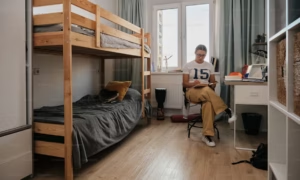Are you tired of scrolling through hotel photos and wondering if they truly show what you’re looking for? Look no further! In this exciting blog post, we’ll discuss virtual reality (VR) and how it’s changing the way we book accommodations. Get ready for an incredible journey as we explore how VR technology lets us enter hotels virtually, walk through rooms, see amazing views, and make confident decisions about where to stay.
Introduction to Virtual Reality (VR)
Virtual reality (VR) is an exciting technology that lets you immerse yourself in a virtual world and explore your surroundings. It has been used in various fields like gaming, education, and training. Now, VR is also being used to help plan vacations.
Using VR to explore vacation destinations is a unique and innovative way to plan your next trip. With VR, you can take a virtual tour of the hotel or resort you’re considering and get a sense of what it’s like before booking. This helps ensure that the accommodations you choose meet your needs and preferences.
There are different ways to use VR when planning a vacation. You can use an online travel agency that provides VR tours of hotels and resorts. Alternatively, you can use a VR headset to take your own virtual tour. There are even apps available that offer VR tours of specific destinations. No matter the method you choose, using VR to explore potential vacation spots is set to transform how you book your next trip!
Benefits of Using VR for Hotel Bookings
Booking a hotel room has become more convenient than ever with online sites and apps. Travelers can easily compare prices and amenities from the comfort of their own homes. However, what if you could actually experience a hotel before making a reservation? That’s where virtual reality (VR) comes in.
VR is gaining popularity for hotel bookings as it lets travelers get a realistic feel for a hotel before committing to a stay. Hotels create virtual tours showcasing their best features, giving potential guests a glimpse of what they can expect.
There are several benefits to using VR for hotel bookings. Firstly, it allows travelers to see the hotel before booking, helping them make informed decisions. Secondly, VR helps travelers save money by comparing prices and finding the best deals. Lastly, VR offers a fun and exciting immersive experience that traditional booking methods can’t replicate.
How VR Can Change the Hotel Booking Experience
Virtual reality (VR) is an immersive, computer-generated experience that can be used to simulate real-world environments and situations. VR has the potential to revolutionize the hotel booking experience by allowing travelers to explore accommodations before making a reservation.
With VR, travelers can take a virtual tour of a hotel room or suite and get a feel for the space before booking. They can also use VR to explore the surrounding area and get an idea of what it would be like to stay in that location. VR can even be used to simulate different travel experiences, such as flying in a hot air balloon or parasailing.
Travelers who use VR to explore hotels and destinations before booking will be able to make more informed decisions about their travel plans. They will also have a more realistic expectation of what their trip will be like, which can help to reduce travel anxiety.
Challenges of Implementing VR Technology
The use of VR technology in the hotel industry is still in its early stages, and there are a number of challenges that need to be addressed before it can be widely adopted. One of the biggest challenges is creating a realistic VR experience that accurately represents the hotel room or property. This requires high-quality 3D models and images, as well as a well-designed user interface.
Another challenge is ensuring that VR headsets are compatible with the various types of software and hardware used by hotels. This includes making sure that the headsets can connect to hotel Wi-Fi networks and work with existing reservation systems.
Hotels need to consider the cost of implementing VR technology. While some guests may be willing to pay a premium for a VR experience, others may not be interested in paying anything extra. Hotels will need to find a pricing model that works for them while still providing value for guests.
Examples of Companies Using VR for Hotel Bookings
Today, travelers are using virtual reality (VR) to explore hotel accommodations before they book their stay. This is especially helpful for those who want to get a feel for the property and see if it meets their needs.
Some companies that are using VR for hotel bookings include:
Airbnb – The home-sharing company offers a virtual reality experience that allows users to view listings from around the world.
Hilton – The hotel chain has developed a VR app that gives users a 360-degree view of select properties. They can also use the app to book a room.
Marriott – Marriott’s VR app lets users take a tour of various hotels and resorts before making their reservation.
TripAdvisor – The travel website now offers a VR feature that allows users to explore hotels and other accommodations before booking their stay.
Ways to Enhance the Customer Experience with VR
Give customers a realistic view of the hotel accommodations: Customers can use VR headsets to get a realistic view of the hotel rooms and facilities before they book their stay. This will help them to make an informed decision about whether or not the hotel is right for them.
Allow customers to virtually explore the local area: VR can be used to give customers a virtual tour of the local area around the hotel. This will help them to see what attractions and activities are available in the area, and plan their trip accordingly.
Offer customer support in VR: Customers can use VR headsets to contact customer support in order to get answers to their questions or resolve any issues they may be having. This will provide a more efficient and convenient way for customers to get the assistance they need.
Conclusion
With the help of virtual reality, hotel booking is becoming incredibly immersive and interactive. Customers can now take virtual tours of accommodations before booking, instead of relying solely on reviews and photos. This significant change in the industry provides people with a better understanding of what they’re getting and boosts their confidence in their decision. As hotels strive to stand out from competitors, virtual reality (VR) technology will continue to play a vital role in the hospitality sector.


































